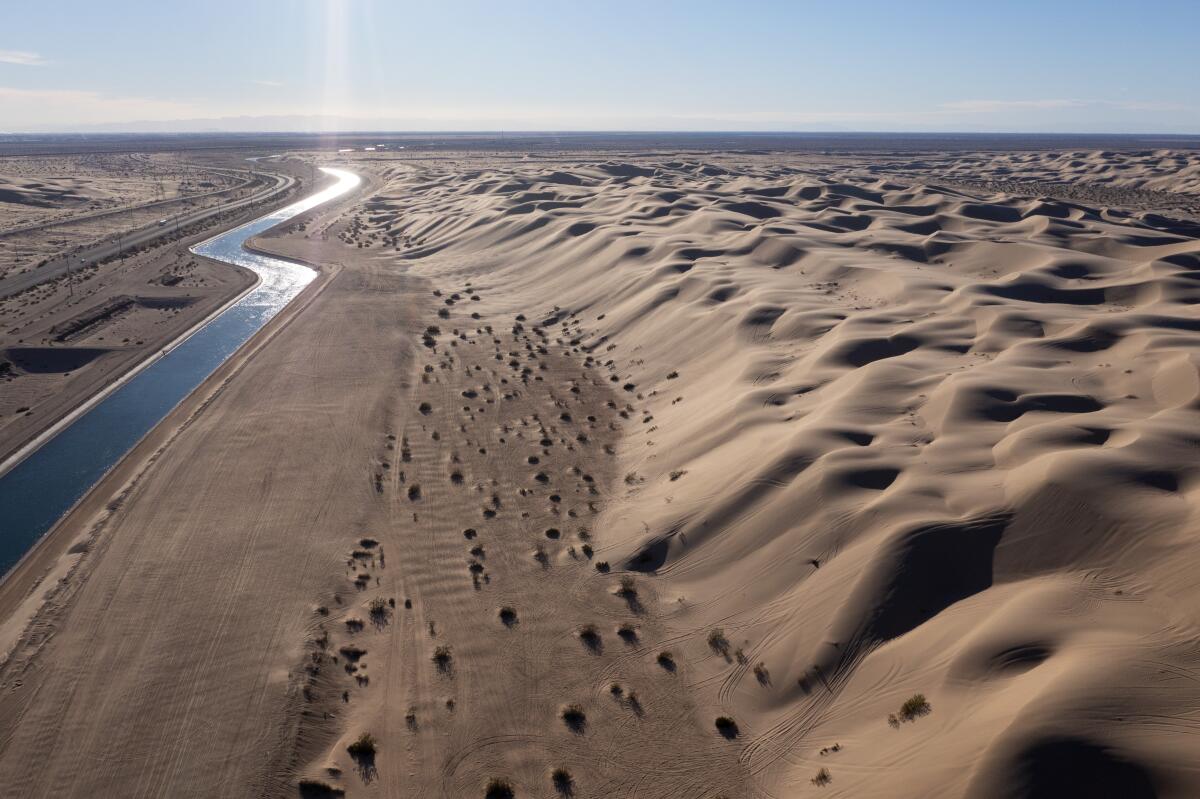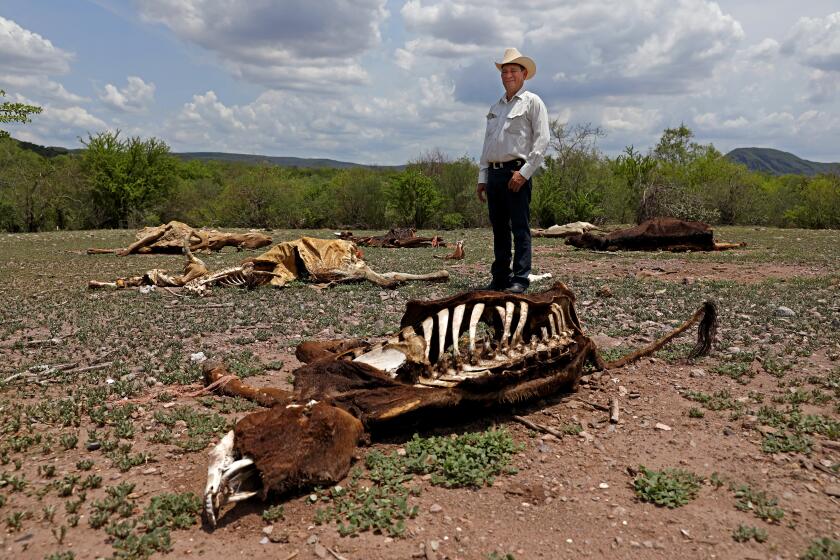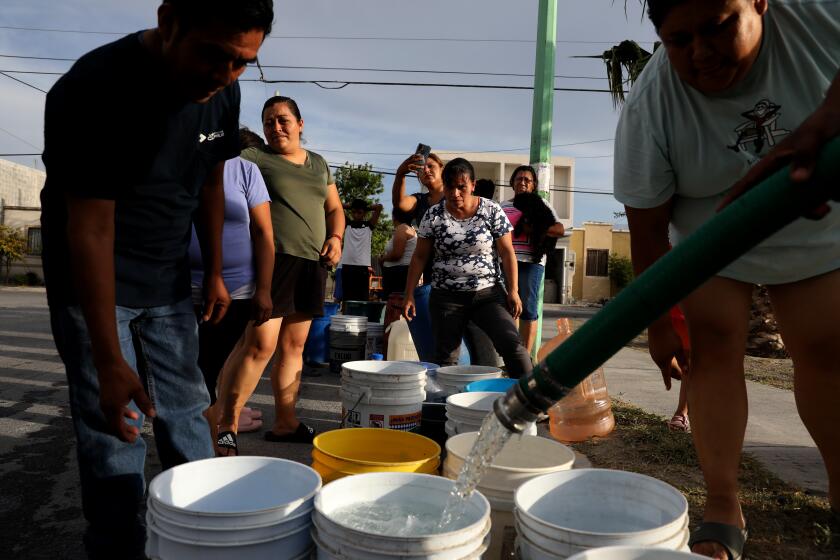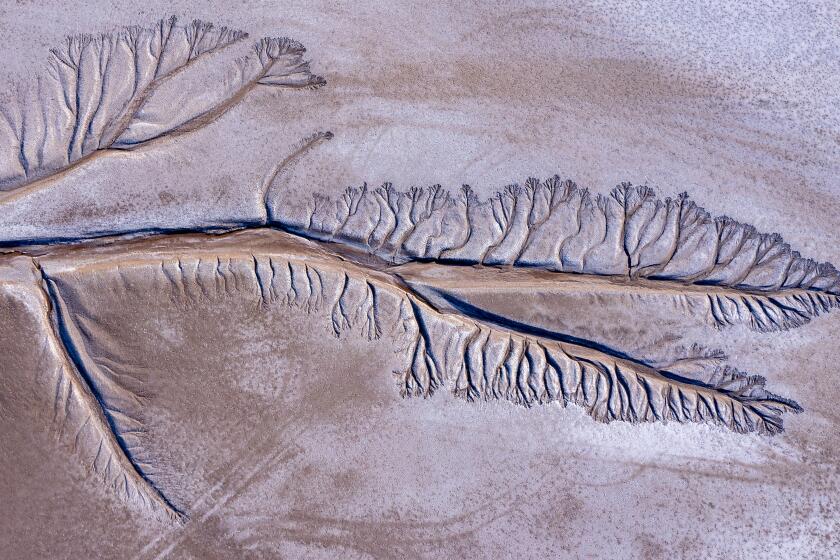Trump threatens Mexico with more tariffs, this time over water

- Share via
- U.S. president says Mexico is failing to comply with water treaty obligations, accusing it of “stealing the water from Texas farmers.”
- Mexican President Claudia Sheinbaum says a drought has prevented her country from meeting its commitments: “If there’s no water, how do you deliver it?”
- Mexico has always repaid its water debts, but the delays infuriate U.S. farmers.
MEXICO CITY — A war over water is brewing at the U.S.-Mexico border.
This week, President Trump threatened Mexico with new tariffs for failing to deliver billions of gallons of water under a 1944 treaty governing the dispersal of three rivers that run through both countries.
“Mexico has been stealing the water from Texas farmers,” Trump wrote on Truth Social, warning that “we will keep escalating consequences, including TARIFFS and, maybe even SANCTIONS, until Mexico honors the Treaty, and GIVES TEXAS THE WATER THEY ARE OWED!”
Mexican President Claudia Sheinbaum says her country has not lived up to its treaty commitments because of a relentless drought that has plagued farmers and ranchers in northern Mexico and left a major industrial city with dry taps.

On Friday, Sheinbaum vowed Mexico would soon deliver “a significant amount” of what it owes, and said her government has been meeting with U.S. officials on the matter for months.
She acknowledged the challenges of honoring a pact signed eight decades ago, long before development boomed along the border and scientists discovered that climate change exacerbates drought.
“If there’s no water, how do you deliver it?” she asked.
Sonora is the cattle capital of Mexico. But prolonged drought is killing off the herds.
The water battle adds another dimension to strained U.S.-Mexico relations.
Trump has already imposed tariffs on Mexico — punishment, he says, for the country’s failure to combat illegal immigration and the production and smuggling of fentanyl.
Stephen Mumme, a political science professor at Colorado State University who is an expert in the treaty, said low water levels have left Sheinbaum in a bind: “There’s only so much Mexico can do.”
“I don’t know that trade threats or punitive measures will really improve the situation,” Mumme said. “A lot of this is just hydrologically determined. They can’t manufacture water.”
At the heart of the dispute is a treaty that requires the two nations to divide the flows from three rivers — the Rio Grande, the Colorado and the Tijuana — across their shared 2,000-mile border.
Under the treaty, the U.S. must supply Mexico with water from the Colorado, which flows from the Rocky Mountains down into Baja California.

In turn, Mexico must give the U.S. water from the Rio Grande. The river — which stretches from Colorado to the Texas coast — and forms the vast majority of the border dividing Texas and Mexico. It is mostly fed by tributaries on the Mexican side, so Mexico can control how much water it contributes to the river.
Mexico is supposed to deliver 1.75 million acre-feet of water — more than 570 billion gallons — to the United States every five years.
The current cycle ends in October, but Mexico so far has delivered less than 30% of what it owes, according to the International Boundary and Water Commission.
According to the treaty, Mexico is allowed to carry its water debt over into the next five-year cycle. Mexico has been forced to do that in the past — it first missed its deadline in 1997 — and has always repaid its debt.
But the delays infuriate U.S. farmers, who say that without regular water deliveries, they are losing their way of life. Last year, Texas’ last remaining sugar mill shuttered, and all of its 250 employees were fired, because farmers no longer have enough water to grow sugar cane.
U.S. Sens. Ted Cruz and John Cornyn, both Texas Republicans, last year pushed the White House to “use every diplomatic tool at its disposal” to make Mexico comply with the treaty.

Brian Jones, a south Texas farmer who grows cotton, corn and soybeans, celebrated Trump’s promise to punish Mexico if it delays water deliveries. For three years, Jones said, he had been able to plant only half his usual crop.
“I don’t have a drop of water more than I did yesterday,” he said. “But now I’ve got the president of the United States saying that he’s going to fight for me.”
Since taking office in January, Trump has dangled the prospect of tariffs on Mexican imports to win cooperation on issues including immigration and security.
On March 4, he imposed a 25% tariff on all goods imported from Mexico. Two days later, he suspended most of them, although new tariffs on autos made there went into effect April 3.
The Mexican economy has taken a severe hit, with the uncertainty scaring off new investors.
Because Mexico depends intensely on sending exports to the U.S., Sheinbaum has largely sought to appease Trump. And while she struck a conciliatory tone on the water issue on Friday, calmly describing his tariff threat as “President Trump’s way of communicating,” she is also under considerable domestic pressure on the issue.
Monterrey’s water management system did not keep pace with explosive population growth. Now, amid massive drought, it is running out of water.
In 2020, a Chihuahua woman was killed during clashes between National Guard troops and Mexican farmers, who forcibly blocked dams that were being used to send flows from the Rio Grande to the U.S.
Former Mexican President Andrés Manuel López Obrador decided instead to give Texas water from a different source: two international dams on the border.
But that had unexpected consequences of its own.
In 2022, taps ran dry in parts of the sprawling industrial metropolis of Monterrey, with many of the region’s 5 million residents without regular running water for months.

To flush the toilet, launder clothing, wash dishes or bathe, residents were forces to haul water by hand from wells.
Beyond drought, demand for water has skyrocketed in recent years, thanks in part to the explosion of manufacturing hubs such as Ciudad Juarez, which is opposite El Paso, and Monterrey.
Mumme said he could not imagine a scenario in which Mexico was able to fulfill all of its water deliver obligations by October.
“To try and extract more water from a system that doesn’t have it is just a fool’s errand,” he said.
Cecilia Sánchez Vidal in the Times’ Mexico City bureau contributed to this report.
In Mexico, where the shrinking Colorado River no longer flows to the sea, some are calling for a “water revolution.”
More to Read
Sign up for Essential California
The most important California stories and recommendations in your inbox every morning.
You may occasionally receive promotional content from the Los Angeles Times.














